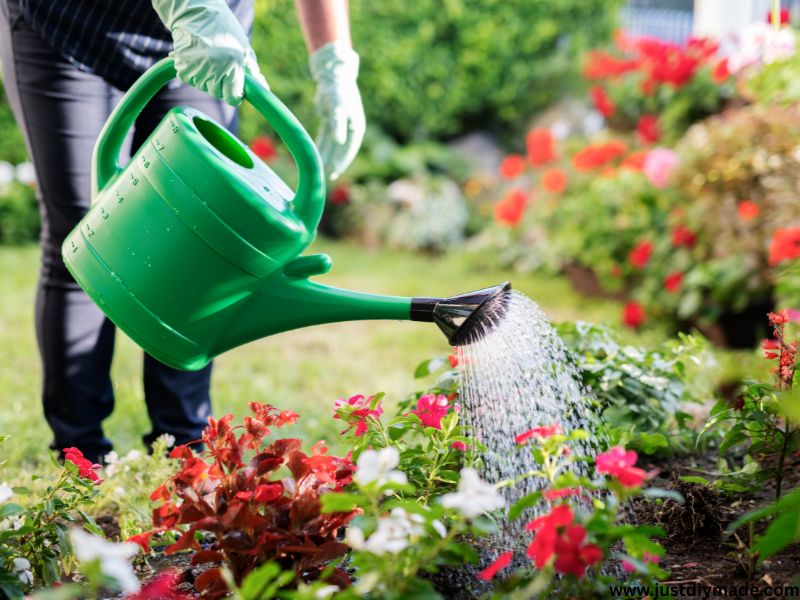This post talks about genius uses for eggshells.
If you’ve ever made scrambled eggs for breakfast and tossed the shells straight into the trash, you’re definitely not alone. Most people see eggshells as nothing more than kitchen waste.
But what if I told you those brittle little shells are actually garden gold? That’s right—eggshells are packed with calcium and other minerals your garden loves, and there are so many smart ways to put them to work outdoors.
Even if you’re a seasoned green thumb or just starting out with your first container plants, eggshells can be one of the most affordable, effective, and eco-friendly tools in your gardening toolkit.
Best of all, they’re completely free—you’re already using the eggs!
So, before you toss your next eggshells in the trash, check out these five genius ways to use them in your garden. You’ll not only reduce kitchen waste but also boost your plants’ health, enrich your soil, and even help control pests. Ready to give your eggshells a second life?
Here are five brilliant ways to use eggshells in your garden:
1. Natural Fertilizer
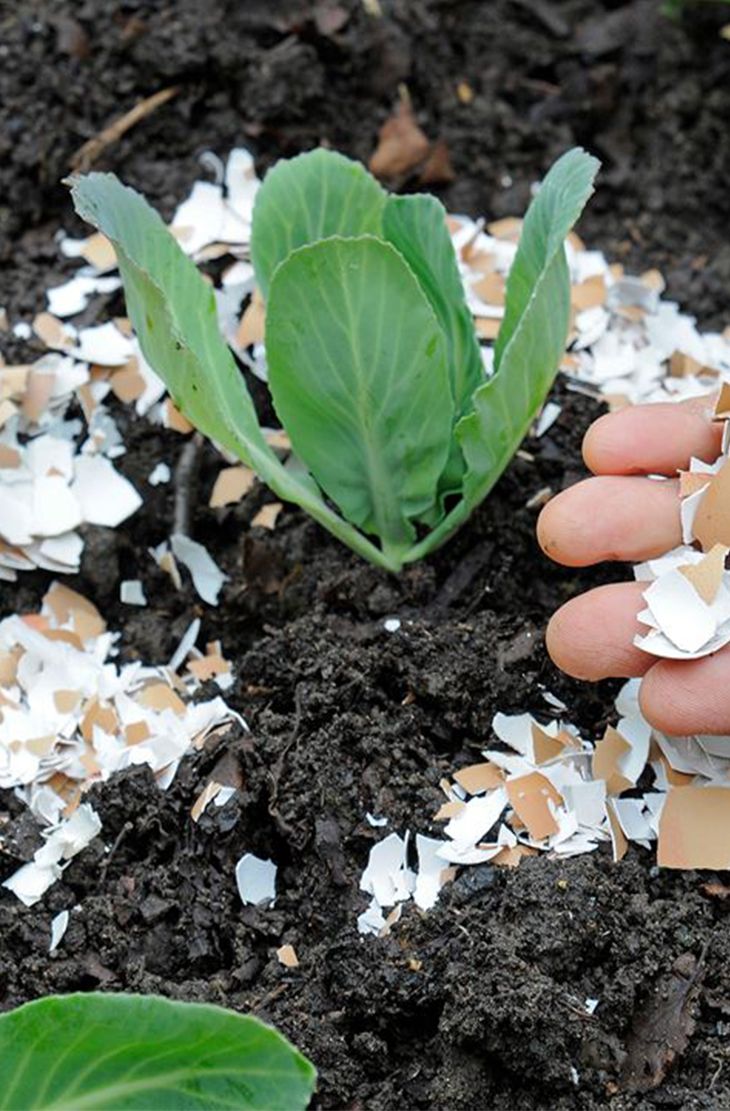
One of the easiest and most effective ways to use eggshells in the garden is as a natural fertilizer. Eggshells are rich in calcium carbonate (about 95%), which is essential for strong plant cell walls.
Many fruits and vegetables—especially tomatoes, peppers, and eggplants—are prone to calcium deficiency, which can lead to problems like blossom end rot. Crushed eggshells can help fix that.
Simply collect your eggshells, rinse them well to remove any residue, and let them dry.
Then crush them into small pieces with a rolling pin, mortar and pestle, or even your hands. Sprinkle the crushed shells directly around the base of your plants or mix them into the soil before planting. This is a genius uses for eggshells.
Tip: It’s okay if your shells aren’t crushed to a fine powder. Larger pieces will still break down over time and gradually release nutrients into the soil.
Pro Tip: If you want to speed up decomposition and nutrient release, bake your eggshells in the oven at 200°F for about 10 minutes before crushing them. This helps them break down faster in the soil.
2. Pest Deterrent
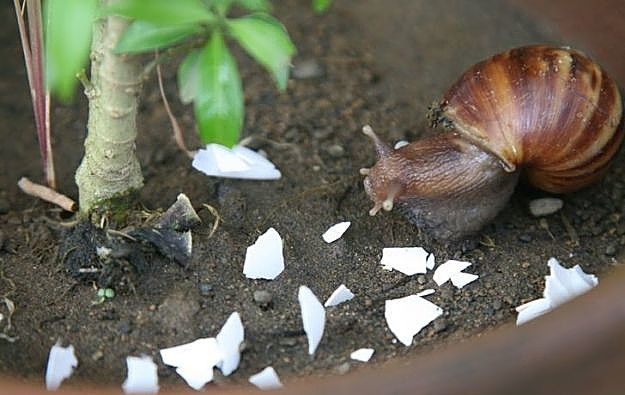
Got slugs, snails, or even cutworms munching on your plants? Eggshells can help!
The jagged, sharp edges of crushed shells are unpleasant for soft-bodied pests to crawl over, so a ring of crushed shells around your vulnerable plants can act like a natural barrier.
While this method won’t eliminate pests entirely, it’s a safe, chemical-free way to discourage them—especially when combined with other organic pest control methods like diatomaceous earth or copper tape.
Tip: Reapply eggshells after heavy rain, as the pieces can become less effective once wet and broken down.
Pro Tip: Combine crushed eggshells with coffee grounds and a sprinkle of cinnamon for a triple-threat pest defense. The shells deter crawling insects, coffee repels ants and cats, and cinnamon has antifungal properties that help protect your soil.
3. Seed Starters
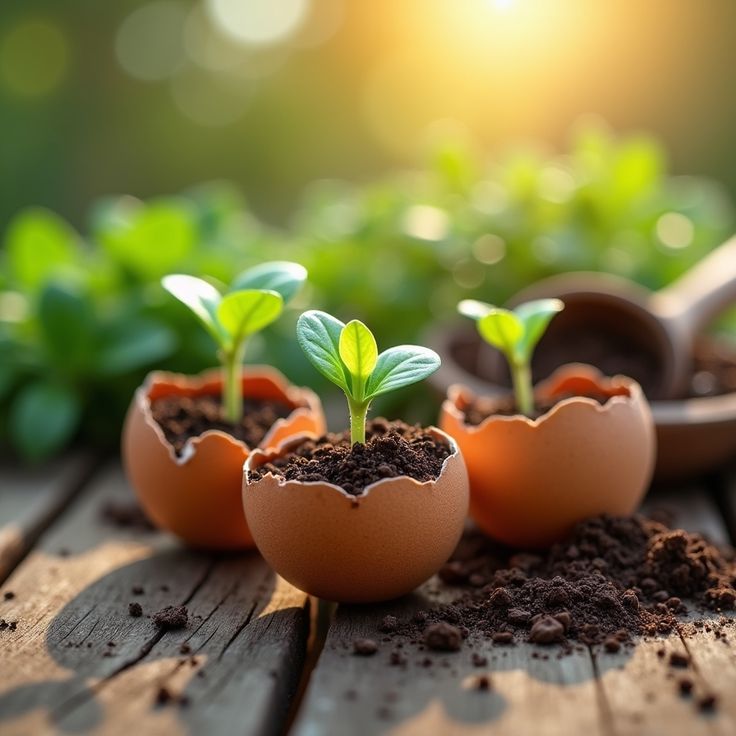
Eggshells make perfect biodegradable seed-starting pods. This is one genius uses for eggshells.
They’re just the right size, naturally compostable, and they add calcium to the soil as they break down.
Plus, using eggshells is an adorable and sustainable way to grow seedlings indoors.
Here’s how to do it:
- Carefully crack your eggs near the top and empty them out, keeping the bottom two-thirds intact.
- Rinse the shells and poke a small drainage hole in the bottom.
- Fill each shell with seed-starting mix and plant your seeds.
- Set them in an egg carton to keep them upright near a sunny window or under a grow light.
Once your seedlings are ready to transplant, gently crack the bottom of the shell to allow roots to escape and plant the entire thing in the soil.
Tip: Label each shell with a marker so you don’t forget what you planted where.
Pro Tip: Use a spoon to gently remove the shell from the egg carton for transplanting—it’s less likely to damage your fragile seedlings this way.
4. Compost Booster
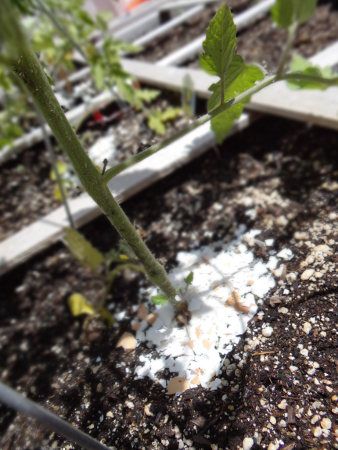
Eggshells are a valuable addition to your compost pile.
They add calcium and other trace minerals to the mix, which improves the overall nutritional content of your compost.
This is especially helpful if you use a lot of fruit and veggie scraps, which can be acidic—eggshells help balance that pH.
Just be sure to rinse your shells before adding them to the compost to avoid attracting unwanted pests. Crushing them helps them break down faster, though whole shells will eventually decompose too.
These are genius uses for eggshells.
Tip: Store your rinsed eggshells in a container on your kitchen counter or freezer until you’re ready to compost.
Pro Tip: Blend the shells in a food processor before adding to your compost bin. Powdered shells decompose even faster and are easier for microbes to digest, enriching your compost more quickly.
5. Soil Amendment for Raised Beds and Containers
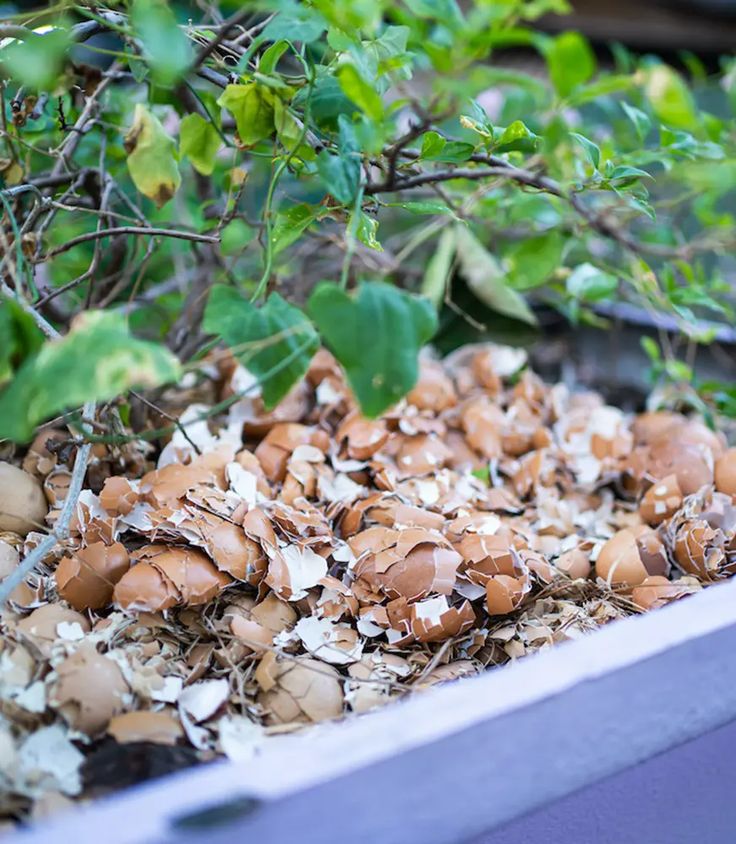
Eggshells don’t just belong around plants or in compost—they’re excellent when mixed directly into your garden soil, especially for container gardening or raised beds.
Over time, they improve soil structure and help with aeration while gradually enriching the soil with minerals.
Before you fill your raised bed or pot with fresh soil, sprinkle a generous handful of crushed eggshells across the bottom.
The genius uses for eggshells helps create drainage and gives plant roots access to long-lasting nutrients as the shells break down.
Tip: Add eggshells at the beginning of each planting season for ongoing benefits.
Pro Tip: Keep a small bucket or container in your kitchen just for collecting eggshells. That way, you always have a stash ready when you’re prepping new garden beds.
Bonus Tip: Eggshell Tea for Plants
Here’s a little bonus hack—make “eggshell tea”! Soak a handful of clean, crushed eggshells in a gallon of water overnight or for up to 24 hours. Strain and use the liquid to water your plants. It’s a gentle calcium boost that’s great for tomatoes, peppers, and houseplants.
Tip: Use this eggshell tea once every couple of weeks to give plants a gentle mineral lift.
Pro Tip: Add a teaspoon of Epsom salt to the eggshell soak for an extra boost of magnesium—another essential nutrient many plants need.
Why Gardeners Love Eggshells
Using eggshells in the garden just makes sense. They’re sustainable, easy to prepare, and full of natural goodness. Plus, they help reduce waste in your kitchen while improving the health of your plants.
Gardeners love anything that’s free, eco-friendly, and actually works—and eggshells tick all those boxes.
Even if you’re growing in containers on a balcony, working with a raised bed, or have a full backyard garden, eggshells are a small but mighty addition that can make a real difference in plant health and productivity.
Eggshells for Specific Plants
Some plants especially benefit from the extra calcium and minerals in eggshells. Try using them for:
- Tomatoes: Prevents blossom end rot
- Peppers: Supports healthy fruit development
- Eggplants: Aids in strong cell walls
- Zucchini: Reduces the risk of calcium-related diseases
- Spinach and Swiss chard: Enjoy extra minerals for leafy growth
Eggshell Prep Tips
- Always rinse your eggshells before storing to remove any leftover egg white or yolk.
- Dry them completely before crushing. You canair-dry them or pop them in a low oven (200°F) for 10–15 minutes.
- Store crushed shells in a sealed container or paper bag until you’re ready to use them.
Final Thoughts
Eggshells are one of those amazing little gardening secrets hiding in plain sight.
They’re humble, often overlooked, and so easy to toss away—but in the garden, they’re anything but trash.
From boosting soil health to protecting plants and helping seedlings grow strong, eggshells deserve a spot in every gardener’s routine.
The next time you crack an egg for breakfast or baking, think of it as more than just the start of a meal. It’s also the beginning of something green and growing right in your own backyard.
With just a few simple steps, you can turn what was once waste into something truly wonderful.
Start saving those shells, get a little creative, and give your garden the boost it deserves—without spending an extra dime.

